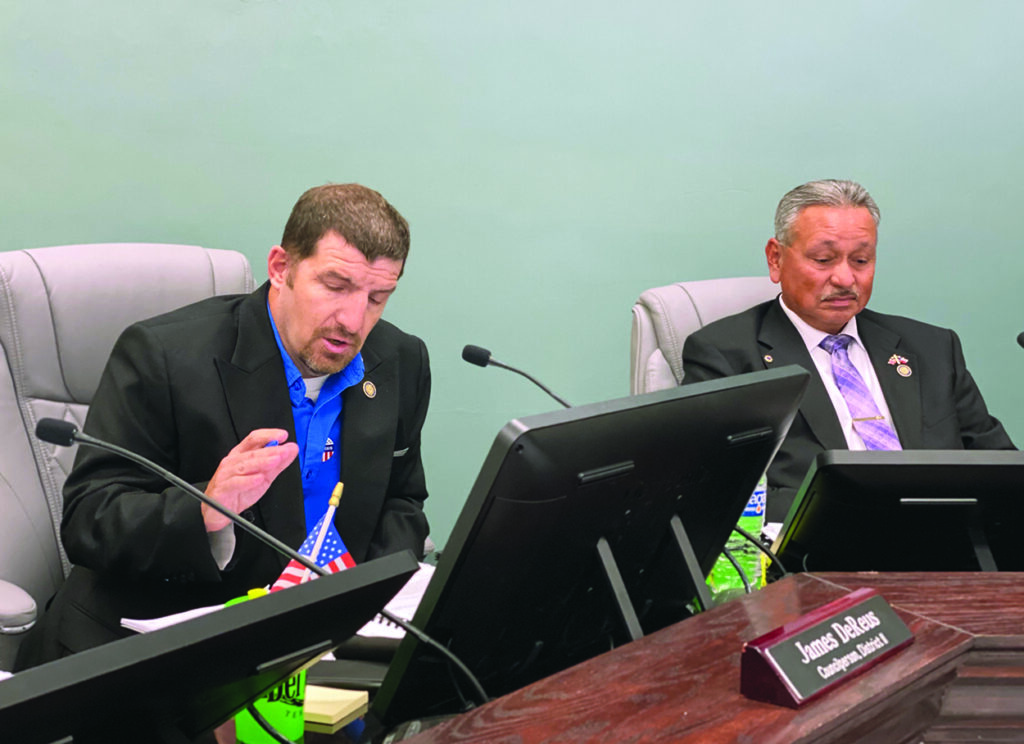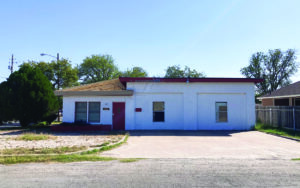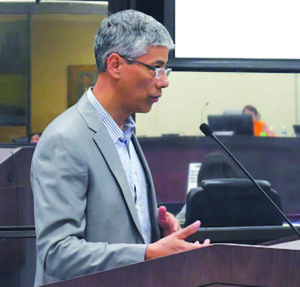By Karen Gleason
The 830 Times
Following a discussion that at times grew tense, city council members on Tuesday voted unanimously to direct the city attorney to continue working on a code of ethics for city elected leaders, administrators and employees.
Consideration of an ordinance establishing a first-ever code of ethics for the city and an ordinance establishing an ethics review board were both on the council’s agenda.
After City Secretary Mari Acosta read the heading of the first of the two agenda items, an ordinance “establishing a code of ethics for the city of Del Rio, Texas,” Mayor Al Arreola asked, “Is there any way that we can discuss (item) G (establishing the code of ethics) and H (establishing an ethics review board) in executive session?”
Mayor Pro-tem Jim DeReus said, “Why would we go to executive session on it?”
City Attorney Ana Markowski Smith said, “There are issues that you can discuss in executive session regarding ethics.”
DeReus interjected, “Why?”
“Well, it would depend on which issues,” Smith replied.
“No, I was asking the mayor why he thinks we need to go to executive session,” DeReus said.
“To dialogue and discuss it, and then we’ll come back out,” Arreola replied.
“But why?” DeReus repeated.
“The whole process and what we’re looking at,” Arreola replied.
Smith, looking at Arreola, said, “If you were to discuss specific instances in which you thought the ethics ordinance might apply, then you could go into executive session.”
“I just want to clarify the whole concept here, but if everybody wants to stay up here on the floor, let’s do it. I don’t have a problem with it,” Arreola said.
He then added, “Okay, let’s do it. Is this up for discussion, or do you want to make a motion? Mr. DeReus, do you want to make a motion, or do you want to discuss it?”
DeReus said he wanted to wait “for other people to make comments because mine will probably take longer.”
Smith then said, “Just to clarify for everybody, I put those notes in the packet. You don’t have to pass it today, so this is a work in progress. It’s an important ordinance, so the longer you take looking through it and asking questions, the better it’s going to be.”
Arreola asked the other council members if they had any questions for Smith.
Councilman J.P. Sanchez then said, “No, I want to make a motion to approve this.”
Councilman Randy Quiñones said he had a question.
Quiñones said, “I’m all for this. What does this do to an elected official that fails to abide by this?”
Smith replied, “Well, it goes to the ethics review board, which is something else you’re going to have to deal with, is appointing (a board), and depending on what the finding is, it could be censure by the city council. There could be disciplinary actions taken or it could be referred to a criminal court.”
“So right now, without this, we can’t do that?” Quiñones asked.
Smith replied, “Right now, you can refer to a criminal court, but we don’t have any in-house control for your city council members, and it also specifies what things are considered unethical, as opposed to, the (city) charter is almost silent on that, and this . . . clarifies conflicts of interest, how you share information, how you use information, those kinds of things.”
Arreola asked if there were any other questions and if there was a second to Sanchez’s motion.
Quiñones said he would second the motion.
Arreola asked again if there were any other questions for Smith.
“Thank you for your hard work,” Sanchez said.
“It is a lot of hard work,” Councilwoman Carmen Gutierrez said.
She added, “The motion, though, would be to accept (the code of ethics) in its entirety, and there are some things in there that I have concerns with. One word, one term, that you use, is, ‘the city council desires to adopt a policy to govern the actions of public officials, code of ethics, and to memorialize the officials’ dedication and service to the citizens of the city.’ What does ‘memorialize’ mean in this particular situation?” Gutierrez asked.
“‘Memorialize’ means to put in writing,” Smith replied.
Gutierrez added, “And also, if I’m understanding correctly, as elected officials, the only way we could be removed from our duties as city council is by petition of recall.”
“That doesn’t change because it’s part of the charter, and you’re correct,” Smith said.
“So there would be some other consequences that would be outlined, not just for ourselves, that would be all public officials, including city administration, is that correct?” Gutierrez asked.
“That is correct,” Smith said.
Arreola then asked about the ethics review board and ask who would appoint the review board.
Smith said the city council would appoint the review board.
When Gutierrez said the appointment of the review board was the next agenda item, DeReus said, “The formal setting up of the board is in the next (agenda item), but it’s included in this, so if we approve this as written, it pretty much, by default, approves the next one (agenda item), right?”
DeReus then began asking specific questions about particular phrases and wording in the proposed code of ethics included in the council’s packet.
After several such questions, Smith told the mayor pro-tem if he wished to go through the code line-by-line, she could do that with him in a different setting. When Arreola noted that is why he wanted to go into executive session, DeReus again said he believed there was no reason to do so.
Smith said if the council indicated it wanted a code of ethics, she could “go on to the next step,” but DeReus said he was not in favor of adopting a policy with language that would need to be revised later.
Smith replied, “No, no, I’m not saying adopting this one. I’m saying adopt, the concept of adopting an ethics policy. What I don’t want to happen is for us to go back and forth, and then come back, only to find out you don’t have the support for an ethics policy in general.”
“Well, if we make a motion to postpone this and bring it back next time with some revisions, I think that at least implies that there will be support,” DeReus said.
“It’s important to me to know that there is support for this policy because I don’t want to spend the next couple of months working on something that’s not going to pass,” Smith said.
Arreola said, “I guess the million-dollar question to (City Manager) Ms. Burkhart, on the cities that you came from, were they using this and what can you tell us about this?”
Arreola then turned to DeReus and said, “I think you’ve been on the council for what, seven years?”
DeReus replied, “Six, but I’m not done.”
“But what I’m saying is this thing hasn’t been in place since then, (un)til now?” Arreola asked.
DeReus, raising his voice, said,” No, we haven’t had one, because honestly, I mean, let’s talk about the elephant in the room. Councilman Quiñones referenced it. The reason that this has come up is because over the past year, there have been a lot of accusations about council members violating the charter. We did not have those conversations until about a year ago. The fact that there was a lot of concern about that happening. That is the genesis of this.”
Arreola then interjected, “Let Ms. Burkhart. . .”
DeReus: “We have only recently started talking about putting an ethics policy, which, let’s be honest, this is pretty much a reiteration of other. . .”
Arreola interjected, “Councilman DeReus, could you. . .”
“No,” DeReus said emphatically, “Because I’m actually talking right now. I have the floor.”
He then added, “Over the past year or so, this concept, this topic, has come up because it has been shown that there has been a need. That’s why we didn’t have one before. Unfortunately, I think we now need one, right? So that is why this has come up, because of what has happened in the past year.”
DeReus he would end his comments with one more question. He then began asking another question about wording, and Smith told him she did not consider the question “substantive,” since it had to do with wording.
“But wording matters, because this could be read that council members are not included under this disciplinary action. That is my concern. And, given the genesis that I just talked about, I think it’s important to stress that, yes, seven council members up here right now are included in this disciplinary action paragraph. Because that’s the whole point, right? Because if we didn’t have those problems over the past year or so, we wouldn’t be doing this. We caused this problem,” DeReus said.
“I don’t think you understand what I’m trying to say,” Smith said.
“What are you trying to say?” DeReus askd.
“It’s difficult when members, when anybody, gets emotional, it becomes difficult to get that person to listen, and I’m have that difficult time right now, but this, the way I view it, this is a work in progress, so,” Smith began.
“So it’s not ready to approve, in its current form,” DeReus shot back.
“Okay, it’s very important to you to be allowed to finish your statement, and the same is true of me. I would like to be able to finish what I’m saying without interruption, if that’s okay,” Smith said.
She continued, “The number one thing to determine at this point, in my opinion, is whether or not we’re going to proceed with a comprehensive ethics policy. That’s the number one thing, and by saying, ‘bring it back,’ my fear is, that, not that it’s going to take two months, but that it could take months down the road, because we, as the city of Del Rio, have the propensity to put things off and not follow through and not finish them. That’s one of the things I’ve found very challenging in this job, that we do not follow up, and there are things that sit on the shelf for a long time. We talk about it, talk about it, and nothing gets done.
“This is truly something that was very difficult to do, and I worked through three versions to get it to this point. To answer your question, I don’t think it’s ready to be passed, and I don’t think it serves a purpose to be up here going line-by-line unless we know for a fact that it’s going to be passed.
“I also don’t think it serves a purpose to get emotional about it and say the reason we’re passing this – whether or not it’s true – is because of things that have happened in the last year. I would like to believe that we’re passing this because it’s the right thing to do, and that each one of us – and I include myself in this – are committed to doing the right thing.
“We’re committed to treating each other with dignity and respect, and that we have a mechanism in which we correct each other, with respect, again. There are situations where no matter how many times you tell somebody not to do something, they’re going to do it, and so there has to be consequences for that, but the first step is to adopt an ethics policy that people are going to be comfortable following and understanding it, and, again, I believe that this is the first step, but it’s important to me to know that each one of you is committed to having an ethics policy so that we can put all our effort into it and make it the best policy we can,” Smith finished.
Arreola then turned to Burkhart and said he had wished to give her the floor “before I got rudely interrupted.”
“Really? Really? You’re going there, Al? Really?” DeReus said.
“I’m just kidding,” Arreola said, then again asked Burkhart to speak.
Burkhart said, “The question before me was whether I had worked with cities that had ethics policies and ethics boards, and yes, I have. They simply serve as a censure, if you will, on actions of employees and/or council, whoever it may be directed at, giving some commentary as to what should have probably played out, rather that what did play out and how one might correct their actions in the future, but that’s basically what it serves as.”
Arreola said, “At this point, I think we probably should, I know I have a first and a second. Can we postpone it (un)til we get all the document done?”
Quiñones said, “Do we need to make a new motion? To direct the city attorney that we do want her to work on something for us?”
“I would appreciate that, I really would,” Smith said.
“I think it’s important. We need it, just like general policies and procedures that keep everybody in line. I think we need to do that,” Quiñones said.
“I think we can agree on that,” Sanchez said.
Gutierrez said she believed the best thing would be to take a vote to see if the council wanted to proceed with a code of ethics. She said she appreciated the work Smith has done, adding she believed the council needed to give Smith an idea if the council wished her to proceed with that work.
Sanchez said he would be willing to amend his motion “so we can make the appropriate adjustments.”
“So would you like to withdraw the (earlier) motion?” Acosta asked.
“Yes,” Sanchez replied.
Quiñones said, “Then I would like to make a motion to direct the city attorney to establish a code of ethics and present it to us for approval.”
Sanchez gave the second.
“Any other questions or concerns?” Arreola asked.
He then called for the vote, and Quiñones’ motion passed unanimously.
The writer can be reached at delriomagnoliafan@gmail.com.




